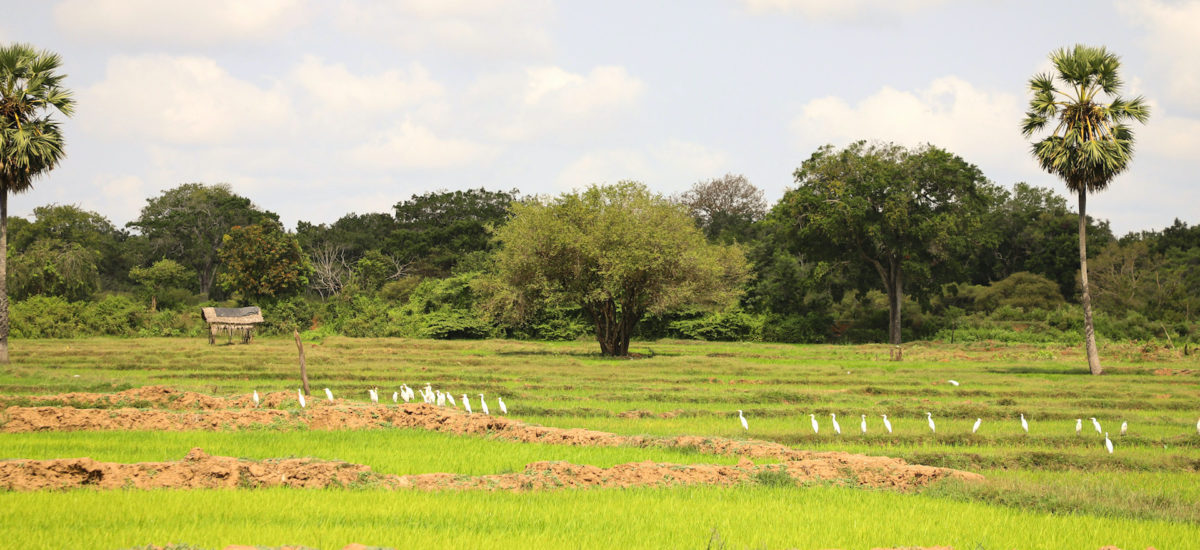Thennamaravadi is an isolated rural village some 65 kilometres north of Trincomalee on the Pulmoddai Road. The inhabitants rely mostly on farming and fishing to make a livelihood. They have some livestock they graze in the nearby forests. They worship at an ancient kovil, upgraded with colourful murals of gods and goddesses.
It was a peaceful existence until 1984 when the war intruded, driving the villagers from their homes and wrecking their lives. One incident in particular caused the flight to Mullaitivu. Seven of the villagers who had gone with their cows to graze in the jungle disappeared. They are believed to have been taken to the nearby army camp. Five family members who went to look for them also went missing. Fearing more trouble, the villagers decided to leave, and as they crossed a river to the other side, they saw flames rising from where their houses stood.
Kandiah Paramanathan was born in Thennamaravadi 80 years ago and has lived there for most of his life. He traces his roots back to South India where his ancestors came from 500 years ago to settle in the village. He did not want to go to Mullaitivu but felt he had little choice. Life under the LTTE was no picnic either with interrogations, roundups and surveillance. When his two school going sons were forcibly recruited into the fighting force, Mr. Paramanathan managed to rescue them three months later and send them off to Vavuniya.
In 2010, he resettled in Thennamaravadi. He looked forward to going back to cultivating his paddy land and doing some fishing. But he, along with 50 other families, found to their dismay that most of their land had been taken over by Sinhalese farmers who had been settled there and were growing rice. Some land had returned to jungle.
“About 200 acres have yet to be given back to us. We have deeds and permits but we can’t get our land back,” he said. As president of the Rural Development Society, Mr. Paramanathan is leading the 11 year fight for justice. Two years ago, five people filed cases in the Trincomalee High Court. Some families don’t have proper documents while others are not able to afford lawyers to fight their cases.
“We have complained to the relevant government authorities and to the Human Rights Commission but there is no solution,” he said. “The District Secretary says the land is under the Provincial Council but it is actually under the central government.”
Like his fellow villagers, Mr. Paramanathan survives by leasing others peoples’ paddy fields and cultivating them while looking on as his own four acres are farmed by strangers. People who still have their land share the work with those who have lost theirs.
“We have given interviews to many people. This government is going after people who are trying to get justice. Once you leave, the CID will come to question us. We have no hope with this government and now even the Tamil MPs don’t care about us,” he said.
When V. Moorthy returned to Thennamaravadi after 26 years of displacement, his four acres of paddy fields were being cultivated by others and he had no means of earning a living. He received no assistance with housing or other resettlement facilities. Caught up in the war, his leg was wounded. With five children and a wife dependent on him, Mr. Moorthy bought some cement block making machines and now survives on the blocks he makes and sells.
Kannapathy Kathiravel is also not allowed to cultivate his own paddy fields. At 72, he makes a living by going for labour work daily and leasing some paddy fields to cultivate so that he can provide for his three daughters who are still in school.
In Kinniya in another part of the Trincomalee District, people in the village of Sinnathotam still live in ramshackle cadjan huts with no permanent housing. They don’t have the deeds for their land although they were promised the documents several years ago.
“I came with five children here in 1990 and later had another child. We are still living in a cadjan hut. We asked the District Secretary for a house given to war affected people but no one has visited us. Last monsoon season, the land flooded. What we most need is a house,” said Kandasamy Vasanthi, whose husband is a fisherman.
In addition the lack of housing, the villagers are plagued by a huge garbage heap on their doorstep. Rubbish from Kinniya is brought and dumped close by, bringing health problems, bad odours and swarms of flies. Crows drop bits of garbage in their wells, polluting the water. Wild elephants come to feed and sometimes come into houses looking for food and causing damage. The dump is cheek by jowl with the Hindu cemetery where the villagers go to bury their dead and pay their respects.
“These people were displaced in 1990 and it is now 2021. According to government policy, the government should help resettled people but they have not been given anything. They paid money to the Land Reform Commission for their deeds in 2018 but they have not received them,” said Sivasekeram Panchalingam, a member of the Kinniya Urban Council.
See video for excerpts from interviews with victims:
See video for excerpts from an interview with a member of the Kinniya Urban Council:


